Related Research Articles

Deeyah Khan is a Norwegian documentary film director and human rights activist of Punjabi/Pashtun descent. Deeyah is a two-time Emmy Award winner, two time Peabody Award winner, a BAFTA winner and has received the Royal Television Society award for Best Factual Director. She has made seven documentaries to date, all have been shown on ITV in the UK as part of its Exposure series.
Gendercide is the systematic killing of members of a specific gender. The term is related to the general concepts of assault and murder against victims due to their gender, with violence against men and women being problems dealt with by human rights efforts. Gendercide shares similarities with the term 'genocide' in inflicting mass murders; however, gendercide targets solely one gender, being men or women. Politico-military frameworks have historically inflicted militant-governed divisions between femicide and androcide; gender-selective policies increase violence on gendered populations due to their socioeconomic significance. Certain cultural and religious sentiments have also contributed to multiple instances of gendercide across the globe.
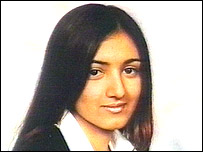
Shafilea Iftikhar Ahmed was a British-Pakistani girl who was murdered by her parents in an honour killing at the age of 17, due to her refusal to accept a forced marriage.
Nāmūs is an Arabic word describing an ethical category in Middle Eastern patriarchal character. Often literally translated as "virtue", it is now more popularly used in a strong gender-specific context of relations within a family described in terms of honor, attention, respect/respectability, and modesty.
An honor killing, honour killing, or shame killing is a traditional form of murder in which a person is killed by or at the behest of members of their family or their partner, due to culturally sanctioned beliefs that such homicides are necessary as retribution for the perceived dishonoring of the family by the victim. Honor killings are often connected to religion, caste, other forms of hierarchical social stratification, or sexuality. Most often, it involves the murder of a woman or girl by male family members, due to the perpetrators' belief that the victim has brought dishonor or shame upon the family name, reputation or prestige. Honor killings are believed to have originated from tribal customs.

Crime in Turkey is combated by the Turkish police and other agencies. Since the 1990s, overall crime in Turkey rose until its peak in 2014. As of 2014, Turkey has seen a 400% rise in crimes, but has steadily declined since then. In 1994, the number of arrested prisoners was recorded as 38,931; 20 years later, as of the beginning of October 2014, the number of prisoners has reached 152,335. According to the data provided by the Ministry of Justice, terrorism and homicide rate has been decreasing year by year after 2014 in Turkey and terrorism is almost never seen.
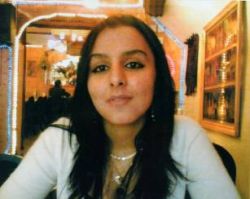
Banaz Mahmod was a 20-year-old Iraqi Kurdish woman who lived in Mitcham, South London, England. She was murdered on the orders of her family in a so-called honour killing because she ended a violent and abusive forced marriage and started a relationship with someone of her own choosing. Her father, uncle and three cousins were later convicted of her murder.
Honour killings in Pakistan are known locally as karo-kari. According to the Human Rights Commission of Pakistan, over 470 cases of honour killings were reported in Pakistan in 2021. But human rights defenders estimate that around 1,000 women are murdered in the name of honour every year. An honour killing is the murder of a member of a family or social group by other members, due to the belief the victim has brought dishonour upon the family or community. The death of the victim is viewed as a way to restore the reputation and honour of the family.
The Shafia family murders took place on June 30, 2009, in Kingston, Ontario, Canada. Shafia sisters Zainab, 19, Sahar, 17, and Geeti, 13, along with their father's first wife Rona Muhammad Omar, 52, were found dead inside a car that was discovered underwater in front of the northernmost Kingston Mills lock of the Rideau Canal, after they were reported missing. Zainab, Sahar, and Geeti were daughters of Mohammad Shafia, 58, and his wife, Tooba Mohammad Yahya, 41. The couple also had a son, Hamed, 20, and three other children. Rona, who was herself infertile, was the first wife of Mohammad Shafia in their polygamous household.
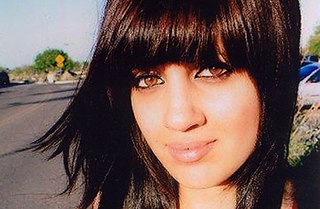
Noor Faleh Almaleki was an Iraqi American woman who was murdered by her father in an honor killing.
Collective Opposed to Police Brutality (C.O.P.B.), also known as Collectif Opposé à la Brutalité Policière, is an autonomous group founded in Montreal in 1995. This organization consists of victims, witnesses, representatives of ethnic communities, marginalized youth, small political groups, the homeless, sex workers, LGBTQ+, drug users, and others who have questions about police authority.
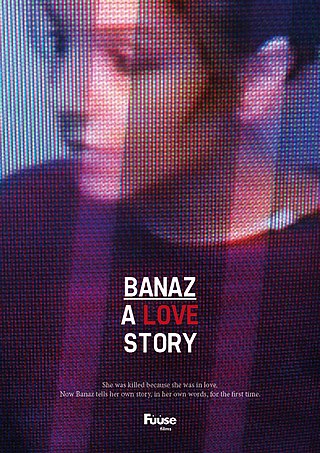
Banaz: A Love Story is a 2012 documentary film directed and produced by Deeyah Khan. The film chronicles the life and death of Banaz Mahmod, a young British-Iraqi woman of Kurdish origin killed in 2006 in South London on the orders of her family in what is euphemistically called honour killing. The film received its UK premiere at the Raindance Film Festival in London September 2012.
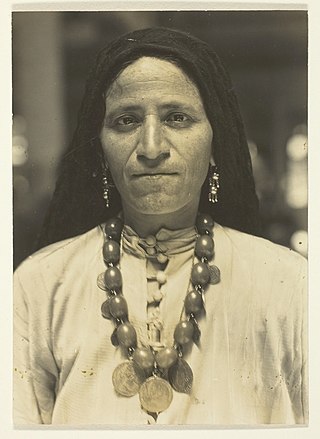
Women in Syria are active participants in social, economic and political factions of Syrian society. They constitute 49.9% of Syria's population. According to World Bank data from 2021, there are around 10.6 million women in Syria. However, Syrian women and girls still experience challenges, especially since the outbreak of the civil war in 2011. They suffer from discrimination, lack of access to suitable healthcare and challenges precipitated by wartime violence.
Rapein Egypt is a criminal offense with penalties ranging from lifetime sentence to capital punishment. In Egypt, marital rape is legal. By 2008, the U.N. quoted Egypt's Interior Ministry's figure that 20,000 rapes take place every year, although according to the activist Engy Ghozlan (ECWR), rapes are 10 times higher than the stats given by Interior Ministry, making it 200,000 per year. Mona Eltahawy has also noted the same figure (200,000), and added that this was before the revolution.
Under-reporting usually refers to some issue, incident, statistic, etc., that individuals, responsible agencies, or news media have not reported, or have reported as less than the actual level or amount. Under-reporting of crimes, for example, makes it hard to figure the actual incidence of crimes.

Violence against women in India refers to physical or sexual violence committed against a woman, typically by a man.

Iqra Khalid is a Canadian politician who was elected to represent the riding of Mississauga—Erin Mills in the House of Commons of Canada in the 2015 federal election.

A Girl in the River: The Price of Forgiveness is a 2015 documentary film directed by Sharmeen Obaid-Chinoy about honor killings in Pakistan. The film is produced by Tina Brown and Sheila Nevins in collaboration with HBO Documentary Films. A Girl in the River was edited by Geof Bartz, A.C.E. The documentary earned widespread critical acclaim. A Girl in the River was shortlisted with ten other documentaries from 74 entries submitted to 88th Academy Awards in Documentary Short Subject category, which it won.
References
- ↑ Shubhi Tandon (2011-06-15). "New site brings dignity to victims of honor-violence". womennewsnetwork.net. Retrieved 2012-02-07.
- ↑ "Singer speaks out against Honour Killings". theasiantoday.com. 2011-05-20. Archived from the original on 2013-02-03. Retrieved 2012-02-07.